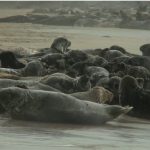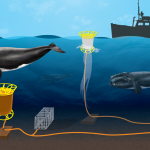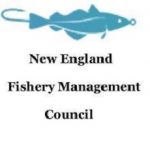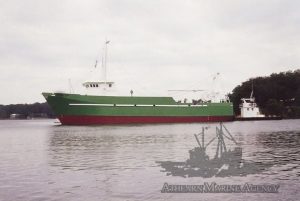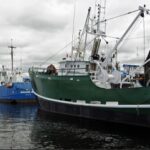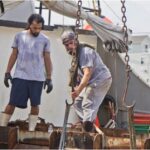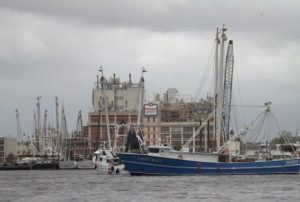Tag Archives: Florida Fish and Wildlife Research Institute
Sixth Right Whale Calf is Sighted
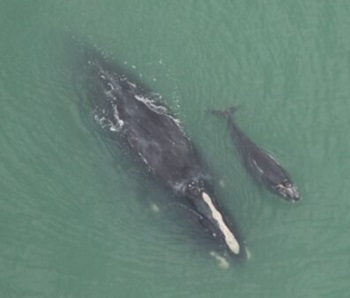 Right whale calf number No. 6 was born off Cumberland Island on Dec. 28, 2023. Halo is a 19-year-old mother of three known calves. Her last calf was born in 2020. Halo has three siblings and five nieces/nephews, all of whom have been entangled on more than one occasion. Halo has callosities behind her blow hole which look as if she wears a halo. Halo’s sister Calamari – #3946 and her son Jagger #5046 both received their names just this year. Halo’s nephew, Kingfisher was entangled eight times in his short life. The last entanglement included a rope around his flipper which persisted until his last sighting in 2015. According to the Florida Fish and Wildlife Research Institute, Halo is known to enjoy the shoreline of Florida beaches. Halo and her calves have been spotted from shore on many occasions. more, >>click to read<< 06:56
Right whale calf number No. 6 was born off Cumberland Island on Dec. 28, 2023. Halo is a 19-year-old mother of three known calves. Her last calf was born in 2020. Halo has three siblings and five nieces/nephews, all of whom have been entangled on more than one occasion. Halo has callosities behind her blow hole which look as if she wears a halo. Halo’s sister Calamari – #3946 and her son Jagger #5046 both received their names just this year. Halo’s nephew, Kingfisher was entangled eight times in his short life. The last entanglement included a rope around his flipper which persisted until his last sighting in 2015. According to the Florida Fish and Wildlife Research Institute, Halo is known to enjoy the shoreline of Florida beaches. Halo and her calves have been spotted from shore on many occasions. more, >>click to read<< 06:56
U.S. Rep. Walter Jones and other congressmen want South Atlantic red snapper fishery reopened
 The representatives said data produced by a Florida research institution shows the South Atlantic red snapper stock is healthier than what federal data indicates so the fishery should be reopened to commercial and recreational fishing. The South Atlantic Fishery Management Council, a division of the National Oceanic and Atmospheric Administration Fisheries program, announced the South Atlantic red snapper season is closed this year because the total number of red snapper removed from the population in 2015 exceeded the allowable level, according to the NOAA Fisheries website. The Florida Fish and Wildlife Research Institute, a subsidiary of the Florida Fish and Wildlife Commission, has data that shows the red snapper stock is healthier than the federal data indicates. “Unfortunately, reports indicate these data are not being considered as ‘best available science’ and, therefore, are at risk of being excluded from the (South Atlantic Fishery Management) Council’s deliberations,” Jones and his colleagues said in a letter to NOAA Administrator Kathryn Sullivan. Read the rest here 09:26
The representatives said data produced by a Florida research institution shows the South Atlantic red snapper stock is healthier than what federal data indicates so the fishery should be reopened to commercial and recreational fishing. The South Atlantic Fishery Management Council, a division of the National Oceanic and Atmospheric Administration Fisheries program, announced the South Atlantic red snapper season is closed this year because the total number of red snapper removed from the population in 2015 exceeded the allowable level, according to the NOAA Fisheries website. The Florida Fish and Wildlife Research Institute, a subsidiary of the Florida Fish and Wildlife Commission, has data that shows the red snapper stock is healthier than the federal data indicates. “Unfortunately, reports indicate these data are not being considered as ‘best available science’ and, therefore, are at risk of being excluded from the (South Atlantic Fishery Management) Council’s deliberations,” Jones and his colleagues said in a letter to NOAA Administrator Kathryn Sullivan. Read the rest here 09:26
USF Study: Skin Lesions on Fish Decline Years After BP Oil Spill
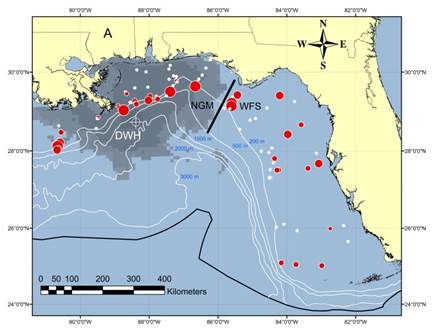 Scientists studying the impact of the 2010 Deepwater Horizon oil spill on the health of fish in the Gulf of Mexico have found strong evidence that an outbreak of skin lesions and oil residue signatures discovered in fishes a year after the spill may be related to the catastrophe. Read more here 15:17
Scientists studying the impact of the 2010 Deepwater Horizon oil spill on the health of fish in the Gulf of Mexico have found strong evidence that an outbreak of skin lesions and oil residue signatures discovered in fishes a year after the spill may be related to the catastrophe. Read more here 15:17

































